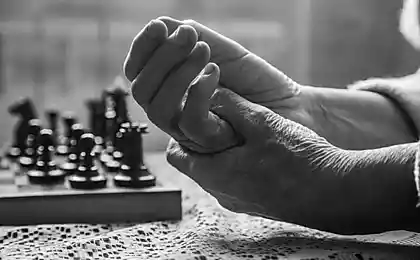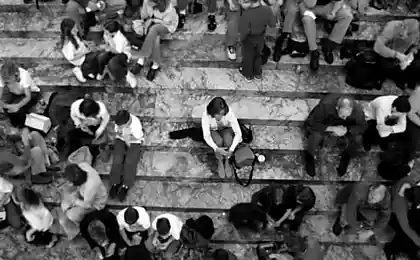539
Why people are lonely
Remember the commercial where Pasha erases pants expensive powder, and Sasha — cheap? If you believe the advertising, the pants are both washed out equally. We all have a friend who got married and gained its reputation as the most miserable person and the same who never tied the knot hymen, but happier. "And if you do not see the difference, why pay more?»
Eighty eight million four hundred sixty five thousand one hundred thirty
So argue those who chose "freedom", that is eternal loneliness. This includes both men and women. Of course, such people usually have relationships with the opposite sex, but they are short and end in nothing. Often these people like and want to create long term relationships and even family, but either they fail or they are completely stop trying to do it. Sometimes it even convinces himself that such problems as "snotty children" or "the wife with a rolling pin/husband is a drunkard" he doesn't need and consciously refuses a serious relationship.
The motive for such decisions, as a rule, is the desire to avoid many problems and suffering associated with close and long-term relationships. Don't want to limit ourselves, no one will chase you to bed at three in the morning when you are busy entertaining computer game, no words can tell you if you went home in the morning in a state of altered consciousness, children crying will not interfere with sleep at night, and beloved mother-in-law or mother-in-law will not spoil a long-awaited weekend.
Often single people are even proud of it — men are very fond of talking about freedom, and women about their independence. According to the famous American psychologist, one of the key figures of neofreudianism Karen Horney, in fact, such a life strategy connected with anything other than the so-called basal anxiety. Paradoxically, at the same time, even not so important how much the person had failed attempts that led to poor relations or to the rupture (although of course they too could make their mark on a conscious or unconscious decision of a person to be lonely, but — contrary to the opinion of the majority is not always key).
Basal anxiety is intense and pervasive sense of insecurity and loneliness. It is often unconscious or only partially conscious. The reasons for this alarm are rooted in deep childhood, in our relationship with our parents. This means that the family of such a person could not meet the needs of the child, first of all, love and sense of security in relation to the surrounding world.
If the child creates the feeling that the world is unsafe, and it is in this world for a helpless creature, he, according to Karen Horney, the neurotic needs are formed. In fact, such needs there is absolutely all people, but only if they are of a neurotic nature, the person turns them (some of them or just one) satisfaction in way of life. So, the excessive need for independence and self-sufficiency may be affected by the fact that people will avoid all sorts of close and lasting relationships (including family) that involve the assumption of any obligations.
Similar opinion is shared by many other prominent psychologists and psychoanalysts, for example, a famous Hungarian-Austrian psychotherapist Michael Balint, who singled out the so-called probations and ocnference picture of the world by different people. Based on the other lies what he called the basic defect (in simple terms, it's something like that, as Karen Horney — the lack of love in childhood, wrong meeting the needs of the child. It can affect even such seemingly nonsensical things, like feeding on the clock, too abrupt withdrawal of breast-feeding, too long — over 6 months — too short or breast-feeding, etc.)
By definition of Balint, the basic defect arises as a result of the discrepancy between the desired child and lots of love, warmth and care and the amount that the mother really could give him). The basic defect, according to Balint, the cause of all pathologies, it is for everyone, because none of us childhood was not rosy. The only difference is the degree of prevalence of this defect. The basic defect is the reason that some people picture of the world becomes ocnference — that is, those people who literally stick to others, are committed to them as to the sense of security and love, while others — probational where a person "loves" only the part of the world where there are no other people. People, he unconsciously fears of those who may cause distress, inconvenience, problems (not to feed, not to continue loving each other, to quit, as once the mother), etc.
And both can be exactly the same "degree" of the underlying defect, but the consequences can be quite the opposite — one will compulsively to the relationship, forgiving all and clutching the last thread, just not to break them. And the other will be as Intrusive (usually under various pretexts, especially for oneself) those relations to avoid. Needless to say that all of it happens almost unconsciously and in order for something to change — it will take years of psychotherapy. published
P. S. And remember, just changing your mind — together we change the world! ©
Source: naked-science.ru/article/psy/pochemu-lyudi-byvayut-odinoki
Eighty eight million four hundred sixty five thousand one hundred thirty
So argue those who chose "freedom", that is eternal loneliness. This includes both men and women. Of course, such people usually have relationships with the opposite sex, but they are short and end in nothing. Often these people like and want to create long term relationships and even family, but either they fail or they are completely stop trying to do it. Sometimes it even convinces himself that such problems as "snotty children" or "the wife with a rolling pin/husband is a drunkard" he doesn't need and consciously refuses a serious relationship.
The motive for such decisions, as a rule, is the desire to avoid many problems and suffering associated with close and long-term relationships. Don't want to limit ourselves, no one will chase you to bed at three in the morning when you are busy entertaining computer game, no words can tell you if you went home in the morning in a state of altered consciousness, children crying will not interfere with sleep at night, and beloved mother-in-law or mother-in-law will not spoil a long-awaited weekend.
Often single people are even proud of it — men are very fond of talking about freedom, and women about their independence. According to the famous American psychologist, one of the key figures of neofreudianism Karen Horney, in fact, such a life strategy connected with anything other than the so-called basal anxiety. Paradoxically, at the same time, even not so important how much the person had failed attempts that led to poor relations or to the rupture (although of course they too could make their mark on a conscious or unconscious decision of a person to be lonely, but — contrary to the opinion of the majority is not always key).
Basal anxiety is intense and pervasive sense of insecurity and loneliness. It is often unconscious or only partially conscious. The reasons for this alarm are rooted in deep childhood, in our relationship with our parents. This means that the family of such a person could not meet the needs of the child, first of all, love and sense of security in relation to the surrounding world.
If the child creates the feeling that the world is unsafe, and it is in this world for a helpless creature, he, according to Karen Horney, the neurotic needs are formed. In fact, such needs there is absolutely all people, but only if they are of a neurotic nature, the person turns them (some of them or just one) satisfaction in way of life. So, the excessive need for independence and self-sufficiency may be affected by the fact that people will avoid all sorts of close and lasting relationships (including family) that involve the assumption of any obligations.
Similar opinion is shared by many other prominent psychologists and psychoanalysts, for example, a famous Hungarian-Austrian psychotherapist Michael Balint, who singled out the so-called probations and ocnference picture of the world by different people. Based on the other lies what he called the basic defect (in simple terms, it's something like that, as Karen Horney — the lack of love in childhood, wrong meeting the needs of the child. It can affect even such seemingly nonsensical things, like feeding on the clock, too abrupt withdrawal of breast-feeding, too long — over 6 months — too short or breast-feeding, etc.)
By definition of Balint, the basic defect arises as a result of the discrepancy between the desired child and lots of love, warmth and care and the amount that the mother really could give him). The basic defect, according to Balint, the cause of all pathologies, it is for everyone, because none of us childhood was not rosy. The only difference is the degree of prevalence of this defect. The basic defect is the reason that some people picture of the world becomes ocnference — that is, those people who literally stick to others, are committed to them as to the sense of security and love, while others — probational where a person "loves" only the part of the world where there are no other people. People, he unconsciously fears of those who may cause distress, inconvenience, problems (not to feed, not to continue loving each other, to quit, as once the mother), etc.
And both can be exactly the same "degree" of the underlying defect, but the consequences can be quite the opposite — one will compulsively to the relationship, forgiving all and clutching the last thread, just not to break them. And the other will be as Intrusive (usually under various pretexts, especially for oneself) those relations to avoid. Needless to say that all of it happens almost unconsciously and in order for something to change — it will take years of psychotherapy. published
P. S. And remember, just changing your mind — together we change the world! ©
Source: naked-science.ru/article/psy/pochemu-lyudi-byvayut-odinoki
























